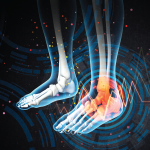“In our study, several amines were found to be significantly associated with DAS28 (six out of seven negatively), CRP (all 12 positively) and ESR (four out of five positively),” write the authors. “Of those amines negatively related with DAS28, histidine, asparagine and threonine were reported to be down regulated in RA patients compared with healthy controls.”
Lara C. Pullen, PhD, is a medical writer based in the Chicago area.
ad goes here:advert-1
ADVERTISEMENT
SCROLL TO CONTINUE
Reference
- Cuppen BV, Fu J, van Wietmarschen HA, et al. Exploring the inflammatory metabolomic profile to predict response to TNF-α inhibitors in rheumatoid arthritis. PLoS One. 2016 Sep 15;11(9):e0163087. doi: 10.1371/journal.pone.0163087. eCollection 2016.


